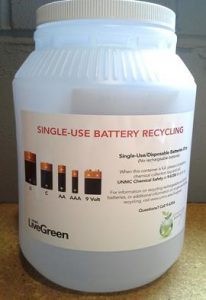Alkaline Batteries (single use)
 Single-use/alkaline batteries (AA, AAA, C, D, 9V) used in campus devices are now being recycled on the Medical Center Campus. There is an opportunity to recycle over 10,000 pounds of single-use batteries per year on campus and this is done at no cost to the end user. The batteries are being recycled by Retrofit.
Single-use/alkaline batteries (AA, AAA, C, D, 9V) used in campus devices are now being recycled on the Medical Center Campus. There is an opportunity to recycle over 10,000 pounds of single-use batteries per year on campus and this is done at no cost to the end user. The batteries are being recycled by Retrofit.
FAQ:
What kinds of batteries can I recycle in the designated white bin?
Only single-use alkaline batteries can be recycled through this program. This includes AA, AAA, C, D, and 9V. Please look at the batteries carefully before placing them in this container as some rechargeable batteries look like single use alkaline batteries. Rechargeable batteries cannot be recycled in these bins.
Are rechargeable batteries regulated by the EPA?
Rechargeable battery regulations vary state to state based on what’s in the battery. In Nebraska, rechargeable batteries are regulated as Universal Waste. Rechargeable batteries used on the Med Center campus must be collected separately, tagged with a chemical collection tag and picked up by Environmental Health & Safety, 559-4386. Rechargeable batteries from home cannot, by law, be brought to the Med Center campus and given to Environmental Health & Safety. Contact “Under the Sink” for disposal information.
Can I recycle single-use watch or button batteries in these containers?
No, those batteries cannot be recycled as part of this program, but please continue to collect them, complete a chemical collection tag and contact the Environmental Health & Safety Office when you are ready for disposal.
I have batteries from home I would like to recycle, can I recycle them here?
No, this is designed for batteries from the Med Center campus only.
Recycling batteries from home at the Med Center campus is potentially illegal (depending on the type of battery), stretches our limited resources, and will risk the future of this program.
I have a container for my department but the lid has gone missing. Is it possible to get a replacement?
At this time, we do not have extra lids.
What do I do when the designated single-use battery container is full?
When your container is full of single-use batteries ready to be recycled, please fill out the online pick-up form.
You no longer need to fill out the chemical collection tag. Your container will be picked up at their earliest convenience; chemical and radiation items will always take priority. Please allow up to five days for the full container to be picked up, and a new container delivered. If you are in an area where multiple people ‘manage’ a battery container, please place a note on the lid indicating the pickup has been requested to avoid multiple requests.
What do I do if a battery is leaking or corroded?
Place any leaking or corroded batteries in a clear plastic bag and then place it in the container for recycling. All other batteries should be loose in the bin, not in any other type of container or bag.
Should I be concerned about acid build up on batteries?
Batteries usually have a long time before acid build up occurs. If it does occur, place the battery in a small plastic bag before placing it in the container.
I would like a container for my department. How can I get one?
If you don’t currently have a container but want to recycle batteries, check with your neighbors. We have a lot of battery containers on campus and there might be one close by you don’t know about. If you do need one, you can use the online pick-up form to request one. Make sure your building and room are listed and mention that you do not need to have a container picked up, just an empty one delivered.
Where do the batteries go?
The hospital and the university have partnered with Retrofit, a company specializing in recycling with environmentally sound practices.
Why does the City of Omaha recommend putting batteries in the regular trash steam?
Alkaline batteries are not regulated by the EPA and by law can go into the trash. It can be challenging and labor intensive to extract the reusable materials/metals from single-use batteries. At this point in time, the City of Omaha does not require that batteries be recycled and does not have a system in place to route these batteries to the appropriate recycling facility. Because these items can be recycled we choose to offer this program.
I have heard that 9-volt batteries can be a fire hazard; is this process safe?
Yes, extensive research with battery recycling companies, transport companies, and manufacturers has been done to make sure this process is safe for the personnel recycling and the locations of the bins.
If you want, you may place a piece of electrical tape over the top of the 9V battery or recap it with the cap from your new battery prior to placing it in the bin, this stops the potential arc that could lead to the potential fire, but this is not required. If you have additional questions or concerns, please contact LiveGreen at livegreen@unmc.edu
If you have any additional questions, please contact LiveGreen at livegreen@unmc.edu.
LiveGreen sincerely thanks Chemical Safety for all of their work on this project.



